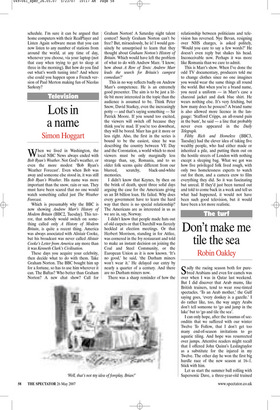Lots in a name
Simon Hoggart
When we lived in Washington, the local NBC News always ended with Bob Ryan’s Weather. Not God’s weather, or even the more modest ‘Bob Ryan’s Weather Forecast’. Even when Bob was away and someone else stood in, it was still Bob Ryan’s Weather. His name was more important than the snow, rain or sun. They must have been scared that no one would watch something called just The Weather Forecast.
Which is presumably why the BBC is now showing Andrew Marr’s History of Modern Britain (BBC2, Tuesday). This terror, that nobody would switch on something called only A History of Modern Britain, is quite a recent thing. America was always associated with Alistair Cooke, but his broadcast was never called Alistair Cooke’s Letter from America any more than it was Kenneth Clark’s Civilisation.
These days you acquire your celebrity, then decide what to do with them. Take Graham Norton. The BBC bought him up for a fortune, so has to use him wherever it can. The Baftas? Who better than Graham Norton? A new chat show? Call for Graham Norton! A Saturday night talent contest? Surely Graham Norton can’t be free? But, miraculously, he is! I would genuinely be unsurprised to learn that they thought about Graham Norton’s History of Britain. Which would have left the problem of what to do with Andrew Marr. ‘I know; how about A Row of Tents: Andrew Marr leads the search for Britain’s campest comedian?’ This in no way reflects badly on Andrew Marr’s competence. He is an extremely good presenter. The aim is to be just a little bit more interested in the topic than the audience is assumed to be. Think Peter Snow, David Starkey, even the increasingly potty — and that’s saying something — Sir Patrick Moore. If you sound too excited, the viewers will switch off because they think you’re mad. If you’re too downbeat, they will be bored. Marr has got it more or less right. Also, the first in the series is bound to be the easiest, since he was describing the country between VE Day and the Coronation, a world which to most viewers must be only marginally less strange than, say, Romania, and to us older folk seems quite different from our blurred, scratchy, black-and-white memories.
I didn’t know that Keynes, by then on the brink of death, spent three solid days arguing the case for the Americans giving us an $8 billion loan. He failed. Why does every government have to learn the hard way that there is no special relationship? The Americans are as interested in us as we are in, say, Norway.
I didn’t know that people made hats out of old carpets or that Churchill was fiercely heckled at election meetings. Or that Herbert Morrison, standing in for Attlee, was cornered in the Ivy restaurant and told to make an instant decision on joining the Coal and Steel Community, or the European Union as it is now known. ‘It’s no good,’ he said, ‘the Durham miners won’t wear it.’ He delayed our entry by nearly a quarter of a century. And there are no Durham miners now.
There was a sharp reminder of how the relationship between politicians and television has reversed. Nye Bevan, resigning over NHS charges, is asked politely, ‘Would you care to say a few words?’ He doesn’t even reply but shakes his head. Inconceivable now. Perhaps it was more like Romania than we care to admit.
This is Marr’s show. When I’ve done the odd TV documentary, producers told me to change clothes since no one imagines you would wear the same things all round the world. But when you’re a brand name, you need a uniform — in Marr’s case a charcoal jacket and dark blue shirt. He wears nothing else. It’s very fetching, but how many does he possess? A brand name is also allowed more licence in the language: ‘Stafford Cripps, an all-round pain in the bum’, he said — a line that probably never even appeared in the Daily Telegraph.
Filthy Rich and Homeless (BBC3, Tuesday) had the clever idea of taking five wealthy people, who had either made or inherited a pile, and putting them out on the hostile streets of London with nothing except a sleeping bag. What we got was how five privileged folk lived rough, with only two homelessness experts to watch out for them, and a camera crew to film everything they did. So it was fascinating but unreal. If they’d just been turned out and told to come back in a week and tell us what had happened, it would not have been such good television, but it would have been a lot more realistic.


















































































 Previous page
Previous page